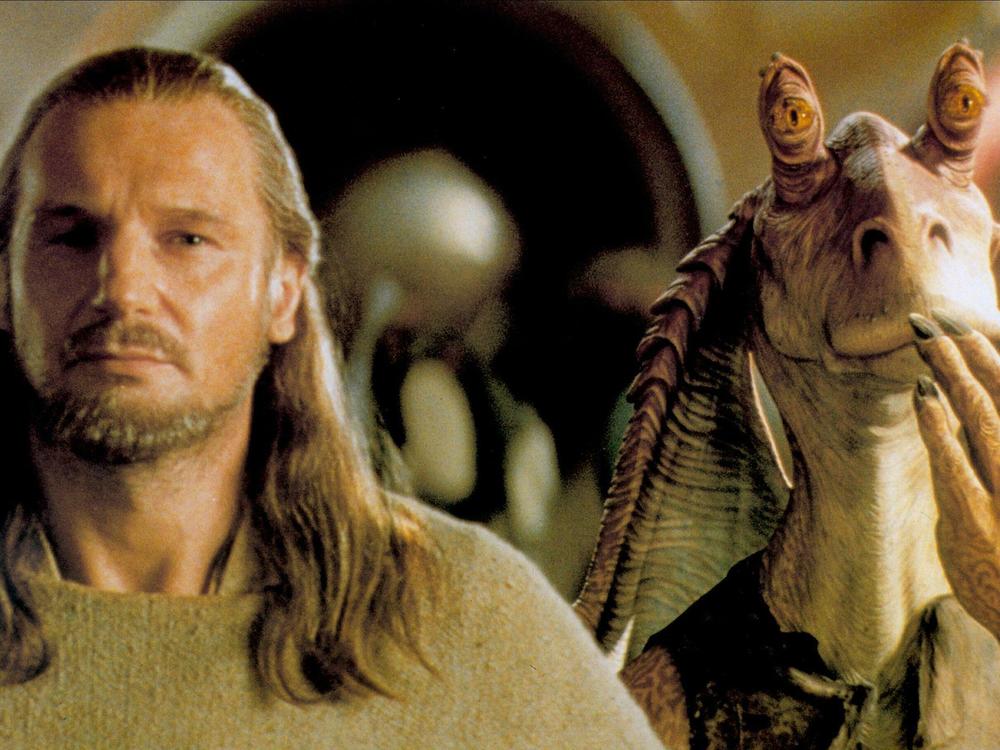Section Branding
Header Content
Critics hated 'The Phantom Menace.' It might be time to reconsider
Primary Content
The year is 1999. Fans are lined up around theaters. News stations are treating it like a breaking news event.
On May 19, Star Wars: Episode I — The Phantom Menace hit theaters, the first movie of the franchise to be released in well over a decade. It promised to tell the origin story of how Anakin Skywalker became Darth Vader.
Fans were so excited some camped out for days, sometimes even weeks, to see the film on opening day.
"The original trilogy was so phenomenal," said one eager moviegoer. "People have been waiting for this for, like, 16 years." Another went so far as to say, "There are now eight wonders of the world, one of them being this movie."
When one reporter asked a crowd if there was any concern the movie might be bad, they responded with a resounding "No." Oh how wrong they were.
You're reading the Consider This newsletter, which unpacks one major news story each day. Subscribe here to get it delivered to your inbox, and listen to more from the Consider This podcast.
The consensus? It was a huge flop
NPR sent two critics to review the film. Neither had much good to say.
Here's how Tom Shales described the movie: "The new Star Wars movie Episode 1 — The Phantom Menace is a menace. It's not about storytelling and it's not about people ... it's about effects and technology. It's a computer movie through and through, by computers and maybe for computers."
NPR's Bob Mondello took issue with the infamous Jar Jar Binks: "'What could he have been thinking,' you say to yourself as [George Lucas] introduces a race of idol-worshiping primitives who speak with Caribbean accents and behave like refugees from Amos n Andy."
The backlash didn't stop there. People hated nine-year-old Darth Vader. They didn't like all the talk of taxes and trade embargoes.
Hating on The Phantom Menace has become somewhat of a punchline in Star Wars circles, says Erich Schwartzel, who covers the film industry for The Wall Street Journal and is writing a book about George Lucas and Star Wars.
He told NPR the hype only amplified the sting of disappointment: "It's really, looking back I think, the first example that I have, and maybe the film industry has, of the movie almost being beside the point."
25 years later, nostalgia has given the film new life
While the overwhelming consensus was The Phantom Menace was terrible, only a Sith deals in absolutes (sorry).
To understand how popular opinion on the film has changed, Schwartzel points to Jar Jar Binks. Schwartzel said most of the fans who grew up on the original Star Wars trilogy would have been in their late 20s or early 30s when they lined up to watch The Phantom Menace.
"[Jar Jar] represents the inherently childish nature of Star Wars, and how childish it can be," Schwartzel said. "I think Jar Jar is a bit of an affront to those fans, sort of being a reminder that this is also for kids."
Now that those kids, whose introduction to the Star Wars world was The Phantom Menace, are adults, it's unsurprising the film is remembered more fondly. The "prequel kids," as Schwartzel puts it, hold The Phantom Menace as dear to them as older fans revere A New Hope.
After a recent anniversary screening of the film in D.C., All Things Considered host Scott Detrow met 29-year-old Eleni Salyers, who said she's been a fan of the prequels since she was a kid: "For me it's nostalgic. Growing up I always preferred the prequels, which is a hot take for many Star Wars fans."
To fans like Salyers, some of the best moments include the lightsaber fights, which compared to those in the original trilogy, are faster and flashier. The Phantom Menace also introduced fans to podracing, with its now iconic visual and sound effects.
The prequel trilogy has played a foundational role in building the Star Wars franchise into a "multigenerational juggernaut," Schwartzel said. He notes that if you look at the fire hose of Star Wars content Disney has released over the last decade, you'll see much of the themes and characters come from the world the prequels created.


